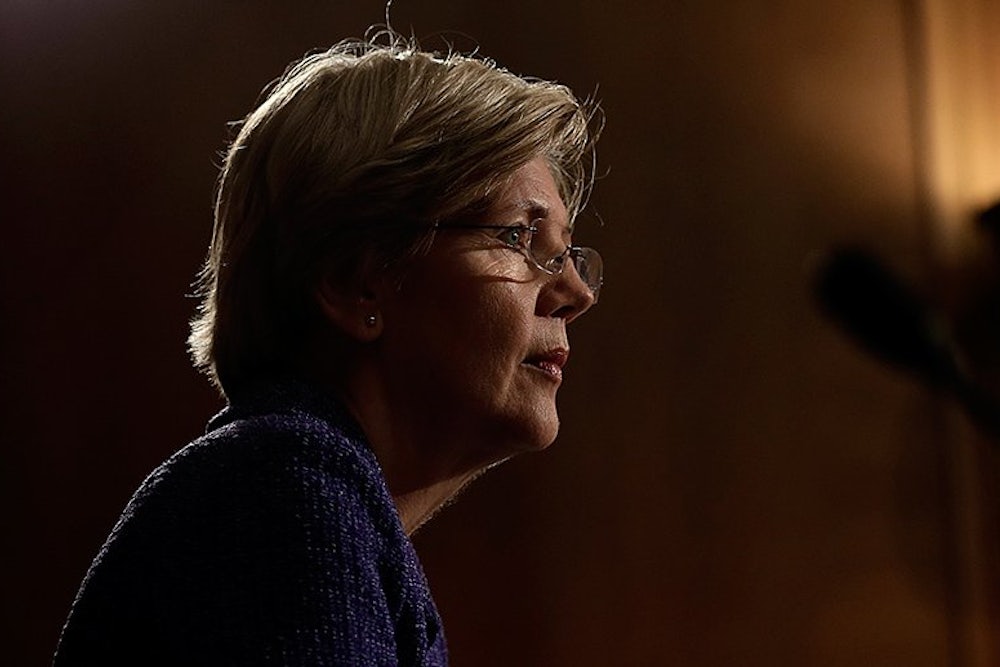In 2013 the Obama Administration wanted Larry Summers to chair the Federal Reserve. A small coalition of senators on the Banking Committee, labor and progressive groups mounted opposition, and Summers withdrew.
In 2014 the Administration wanted Antonio Weiss, a Wall Street dealmaker at the investment bank Lazard, for the number three job at the Treasury Department. A small coalition of senators on the Banking Committee and progressive groups mounted opposition, and yesterday, Weiss withdrew.
The two events were similar, but one big thing has changed: the role of Elizabeth Warren. She never actually made a public statement in the Summers fight, making her presence felt behind the scenes. But she orchestrated and controlled the Weiss fight, very vocally going after him and everything his selection represents about the coziness between Washington and Wall Street, on both sides of the aisle. Without Warren’s opposition, Weiss would still be the nominee.
Warren’s ability to work the levers of power from inside and outside shows how quickly she is mastering Senate politics—and why her push to put populist economics at the center of Democratic Party politics is working.
Warren saw Weiss’s nomination as another example of leading Democrats reflexively turning to Wall Street for economic expertise, which consequently leads to policies favoring the financial industry. And despite her new role in the Democratic leadership of the Senate, she was willing to make a stink about it, enough so that she rallied other senators, from Tammy Baldwin on the left edge of the party to Joe Manchin on the right, to her side.
In his withdrawal letter, Weiss said that he didn’t want his nomination to become a drawn-out distraction. He accepted a job instead as a “counselor” to Treasury Secretary Jack Lew, sidestepping the Senate confirmation battle (a replay from when Tim Geithner hired former Bear Stearns partner Lee Sachs as his counselor). The role gives Weiss a voice in policymaking decisions at the Treasury, but strips him of any statutory authority. The White House and Lew said separately in statements that “the opposition to his nomination was not justified.”
The Weiss affair will certainly lead to the White House thinking twice about future nominees. The Progressive Change Campaign Committee has already floated “progressive economic thinkers” like former Senator Byron Dorgan and economist Dean Baker for the Treasury spot. At the very least, in the future you should expect Warren to be consulted on a nominee before, and not after, the announcement.
So why is the Warren wing of the party ascendant? First, Democrats are languishing with their smallest House minority since the 1940s, and a state legislative minority dating back to the pre-FDR days. Part of the success stems from the ideological winnowing of the party, through losses in red states and purple districts. There’s less of a battle of ideas to be fought. But that doesn’t fully account for the change during just the last few weeks.
Last week, Democrats in the House surprisingly scuttled a bill that would have added a number of exemptions and delays to the Dodd-Frank financial reform law. It was brought up under a suspension of the rules, requiring a two-thirds vote. And while elements of the bill had plenty of Democratic support in the past, the mere publicity of a handout for Wall Street sent them scurrying away. The bill has returned under regular order, but the Democratic flight from it is notable.
On Monday, senior Democratic leadership announced a new tax redistribution proposal that funds large tax cuts for the middle class with a 0.1 percent fee on financial transactions, as well as capping tax deductions for the top 1 percent of households. And President Obama’s proposal for two years of free community college tuition, which stands to benefit the middle class the most, can also be seen as part of this shift.
This didn’t happen solely because of a more agreeable, ideologically coherent caucus. It happened because Warren also saw an opportunity to use her star power to bring attention to issues she cares about. And the movement to draft Warren into the upcoming presidential race gives her added power, even if she never personally gives a hint that she’s running.
Warren’s contributions won’t show up in a legislative score. She didn’t record a vote against Larry Summers or Antonio Weiss. She uses her Senate seat to move the party in her preferred direction. That can happen through the unleashing of outside activist groups. It can happen by issuing direct threats to people within her own party. Or it can happen by doling out rewards—something that Warren, one of the Democratic Party’s biggest fundraising magnets, is well positioned to do. It uses every possible tool to arrive at the desired result. In just a couple years, Warren has employed these skills to become the face of the party.
Democrats’ 2014 midterm campaign was hurt by a vague and unfocused agenda. Warren’s signature issues—no more favors for Wall Street, a lifeline for the middle class, tax equity, higher education without debt—actually fit together, telling a story to the public about priorities. You see that on display in this conversation between Warren and FDIC chair Sheila Bair. It's a broad message, bringing in wage-earners who don't benefit from tax loopholes, or small business owners without lobbyists to tuck in goodies for their bottom line. Warren's idea that most people suffer from increased financial burdens when a small slice of the population reaps the gains has a focused, widespread appeal.
